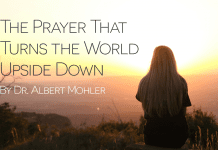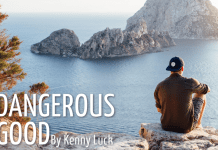With Jack Alexander
Leadership coach Jack Alexander tackles a very deeply-entrenched mindset among people all over the world today: the fear of not having enough. Let’s learn what inspired him to write on this important topic:
My personal experience of losing my father at a young age in a home without a faith demonstrated how fear and scarcity thinking can take over a person or a family. One of the challenges in our nation is that the average family has not seen a rise in real (after inflation) income in 17 years. Many have lapsed into this scarcity mindset. God commands us to “fear not” over 100 times. He says He has “given us everything pertaining to life and godliness.”
God has given me a passion for people to understand how to access not just His provision but to see how closely that aligns with our walk with God.
Jack, you take readers of your new book, The God Guarantee, on a journey from the “Land of What Is” to the “Land of What Could Be.” These two places represent our beliefs about capacity. Would you describe capacity, as it relates to these archetypal lands?
Yes. The Land of What Is is based in what we see, feel and experience. It is where reason and science often take us—what we can observe and measure is all there is.
Dealing with these present realities is part of life, and I say it is important that one of our “feet” is firmly planted here. The other “foot,” however, is planted in The Land of What Could Be, where, in faith, we experience the whisper and movements of God.
In addition to what God has built into us, others, and creation, we continually come across new people and circumstances. We know that God is for us AND that we live in a spiritual battle and, finally, that He has a plan. My experience is that people tend to either live in a static “What Is” land or the “Could Be” land. Walking with God is an adventure as we not only deal with obvious realities but actually make decisions and live in a faith-filled and redemptive manner. I believe that when we do that God unlocks and unleashes not only provision but purpose in our lives.
You say that potential is al-ways limited, but capacity is limitless: Explain how this is so.
Yes. This point is critical. As selfish people, we all want to “fulfill our potential” to be all that we can be. God, on the other hand, wants us to be all that we can be for Him and His Kingdom. Take Joni Earickson Tada, who was paralyzed in a diving accident when she was young and became a quadriplegic. Her “potential” was cut short in so many ways but her speaking, artwork, and life of faith have moved millions. Her “capacity” was increased by her accident. I see many people who are embittered and can lose faith because they interpret negative experiences as God not loving them.
A basic tenet of our faith is that “unless a seed falls into the ground and dies, it will not bear fruit.” When we lean into our weaknesses and brokenness that is when God says that “He will be strong” for us. Our “capacity” for life actually increases with suffering.
The death of my father at a young age gave me tremendous passion and ministry for young men with-out fathers and widows. This heart-breaking loss has result-ed in incredible spiritual fruit that I am now thankful for.
You describe the “Land of What Is” as our scarcity-driven culture, and the “Land of What Could Be” as faith and possibility. How does the “paradigm of capacity” help us to see beyond scarcity to possibility?
Again, The Land of What Is is one of scarcity driven by the laws of godless economics and human reason. It does not take into account the power and plan of God or our community. We helped a middle aged unemployed woman with rotten teeth who was estranged from her family. We got her new dentures which gave her a beautiful smile. Shortly afterwards, she got a new job and her family invited her over for the holidays. In the book, I talk about common beach sand being turned into silicon, the brains of our smart devices, through a process of separation and purification in a hot oven. Capacity thinking looks at what God created someone or something to become.
All raw materials go through a value add process to become something else. It’s an adventure to ask God for eyes to see what our children or others can become in Him.
We often see God change us and provide for us as we serve others and lean into Him.
How do we develop this mindset and discover a “land overflowing with provision?”
When we commit our lives to be loving, redemptive agents for others, and especially for the broken hearted and poor, fasten your seatbelts…God is ready to take you on an adventure.
A change in mindset can happen when we study how God provided in the Bible. Five times in Scripture, Jesus provides for relational, practical and spiritual needs in a four-part pattern. I call it the pattern of provision. Accessing all that God is providing in your life involves trusting Him enough to step into each of the four significant parts.
1. Capacity – God’s vision for what could be, for more – for you, your circumstances and the people in your life.
2. Consecration – inviting God into all areas of life – our efforts, experiences, strengths and struggles, to set our lives apart for His glory.
3. Challenges – seasons of loss or pain in the wilderness when God meets us, draws us deeper into relationship and continues our transformation.
4. Community – leaning into relationships – our provision almost always comes through others and, oftentimes, unexpectedly. We are meant to be interdependent, to function as one body. It is how God created us.
Saying “yes” to God in each of these steps triggers intimacy and provision from Him. It is a battle as we have an enemy who loves our “no’s” and desires our despair.
You speak about the limitless capacity of the universe. What do you mean by this?
Think of the functions of a smartphone. GPS, accessing an unlimited number of songs, sending messages to the other side of the world in seconds, etc. All that started with common beach sand, the second most common element on earth, silica. Everything in the world can become something else. Everyone in the world can become a redeemed miracle. Without Christ, I would probably be a gambler in Las Vegas with a wasted, destructive life. It’s not surprising that God can do miracles. It IS surprising that He wants to use us. We need the wisdom of God and enlightenment of His Spirit to know what to do. We need faith to have eyes to see what someone can become and we need humility to know we are desperate for God to move.
As a leadership coach, what are a few questions you ask to help your leaders focus on capacity rather than scarcity. How can these questions help develop a more God-like outlook on “what could be?”
I often ask “what would you do if you had unlimited resources?” In a business, “what would you do if you could hire any person or buy any company?” “Blue sky” questions like this help move people out of their present realities. They head us down the path of potential. Then, you want to overlay it with God’s desires. How is He leading? What circumstances or new people is He bringing into play? Finally, prayer is critical. Lord, open our eyes and our hearts.
How can our partnership with God in developing the seeds of capacity in our own lives help us to “learn, grow and create?”
Good question. I would start with the incredible capacity in God’s Word. It is the revelation of God, of His heart and of His operating system of mercy and truth. There are thousands of promises. His Word makes simple people wise, it and the Spirit lead us and guide us. Biblical illiteracy is one of the tragedies of our day. Malcolm Gladwell says the tipping point of being a master at something is 10,000 hours. How many people have set a goal to spend 10,000 hours seeking God and discerning His will and ways? He says “all things are possible to those who believe.”
Jack Alexander has built and led companies in real estate, business services, and technology. He is currently chairman and co founder of a software firm called Under story, as well as for The Re-imagine Group, a content company that makes high-quality media for the church market. He is a regular speaker, coach, and board member for a number of businesses, nonprofits, and ministries. Jack lives in Atlanta, Georgia, with his wife, Lisa. They have three grown sons and five grandchildren.

















